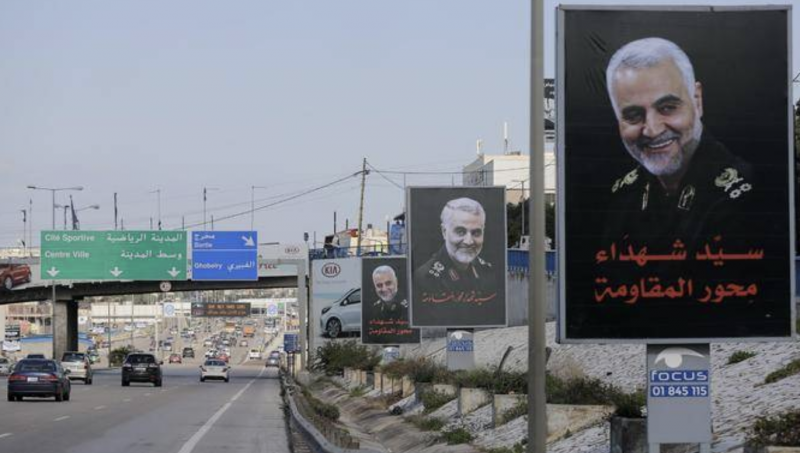
A stretch of road leading to Beirut International Airport lined with posters of Iranian military commander Kassem Soleimani, assassinated in Iraq on Jan. 3, 2020. (Credit: AFP)
Bassam Bou Hamdan almost lost his life at the wheel one evening in March, when a concrete block fell on his windshield as he was driving in the vicinity of a tunnel on the airport road. The latter is the highway adjacent to Beirut International Airport (AIB) which connects the capital to South Lebanon.
“It was a block like the ones you put at the entrances to buildings or on sidewalks,” to prevent cars from parking or blocking certain entrances, he told L’Orient-Le Jour.
Thrown by unidentified individuals from a bridge over the highway, “The stone landed on my windshield, which shows that the criminals didn’t care about my survival,” he said.
He continued that he then speeded up to get away. He believes that there’s no doubt that his assailants wanted to force him to stop the car to rob him.
For weeks, driving on the airport road has been a scary experience for motorists. The number of assaults and other incidents seems to have multiplied, prompting caretaker Interior Minister Bassam Mawlawi to announce on April 24 a new security plan for Beirut, including “more patrols on the airport road.”
“We’ll ask to have this road lit,” almost five years after the country’s economic collapse, during which electricity supply by the state-owned institution has been considerably reduced.
Despite the incidents reported in the media, the Lebanese Army and the Internal Security Forces (ISF) eased this rise in public concern. “There’s nothing to worry about for travelers. Moreover, the attacks did not take place directly in front of the airport, but in the adjacent tunnels,” said a military source on condition of anonymity.
An ISF anonymous source went so far as to describe the insecurity on the airport road as a “myth.”
L’Orient-Le Jour tried to speak with an airport official to comment on the measures in place to ensure the safety of travelers. The official was not available. So, what’s really going on?
‘Our customers are scared, especially at night’
Motorists reported incidents similar to which Bou Hamdan faced in the same area. A video posted on social media, dated April 18, showed two motorcyclists riding the wrong way and chasing a man on a moped.
The victim managed to lose the thieves, a security source said. One of them was arrested by army intelligence. His accomplice is still at large. Three days later, an army statement said a man was arrested in Hay al-Sellom, in Beirut’s southern suburb. He confessed to 120 thefts — including 80 on the airport road —, the statement added.
A cab driver interviewed by the YouTube channel Spot Shot Videos faced another incident. He showed in the interview his windshield with several cracks due to stone-throwing while transporting passengers from the airport.
Dany Habshi, owner of a cab company near the capital, told L’Orient-Le Jour that his drivers dread this road. “We take precautions when we go there. We’ve already had quite a few problems there in recent years, and the situation has gotten worse recently,” he said.
“On the way to drop someone off at the airport, we close the [car] doors. We don’t stop for coffee on the way. Even our customers are scared, especially at night. We avoid [going to] the airport after midnight,” he said.
In crisis, the country relies heavily on arrivals from overseas to breathe new life into its economy. “We don’t want passengers to be afraid. The robberies that took place did not take place in front of the airport,” said an ISF source. The source accused the media outlets and social media of “exaggerating,” adding that “crimes are on the decline in Lebanon,” without however being able to provide figures.
The above-mentioned military official said the gangs of criminals operating in this area often take refuge in the Palestinian camps of Burj al-Barajneh, Shatila and Sabra, or even in Syria, to evade the security forces.
“The thieves use innovative methods. Sometimes, they ask a female accomplice to create a problem on the side of the road. As soon as a motorist stops to help her, they steal the vehicle. Others hit another car on purpose to get it to stop,” the source said.
Despite this gloomy picture, the military source said that “security is in good hands.” “We can’t be everywhere, especially as the administration is barely functioning. But as long as the army and security services are still able to work and make arrests, then it’s a good sign,” the source said.
The source added, “We have stepped up patrols in the area and even on the old airport road, which is located in Beirut’s southern suburb and used to be taken by passengers before the highway was built.
Bou Hamdan said he tried to call the police emergency number the night he was attacked, but “nobody picked up.” Since then, he has stopped using the road and has forbidden his son to use it, forcing him to make a detour to get to university.
This article was originally published in L'Orient-Le Jour. Translated by Joelle El Khoury.